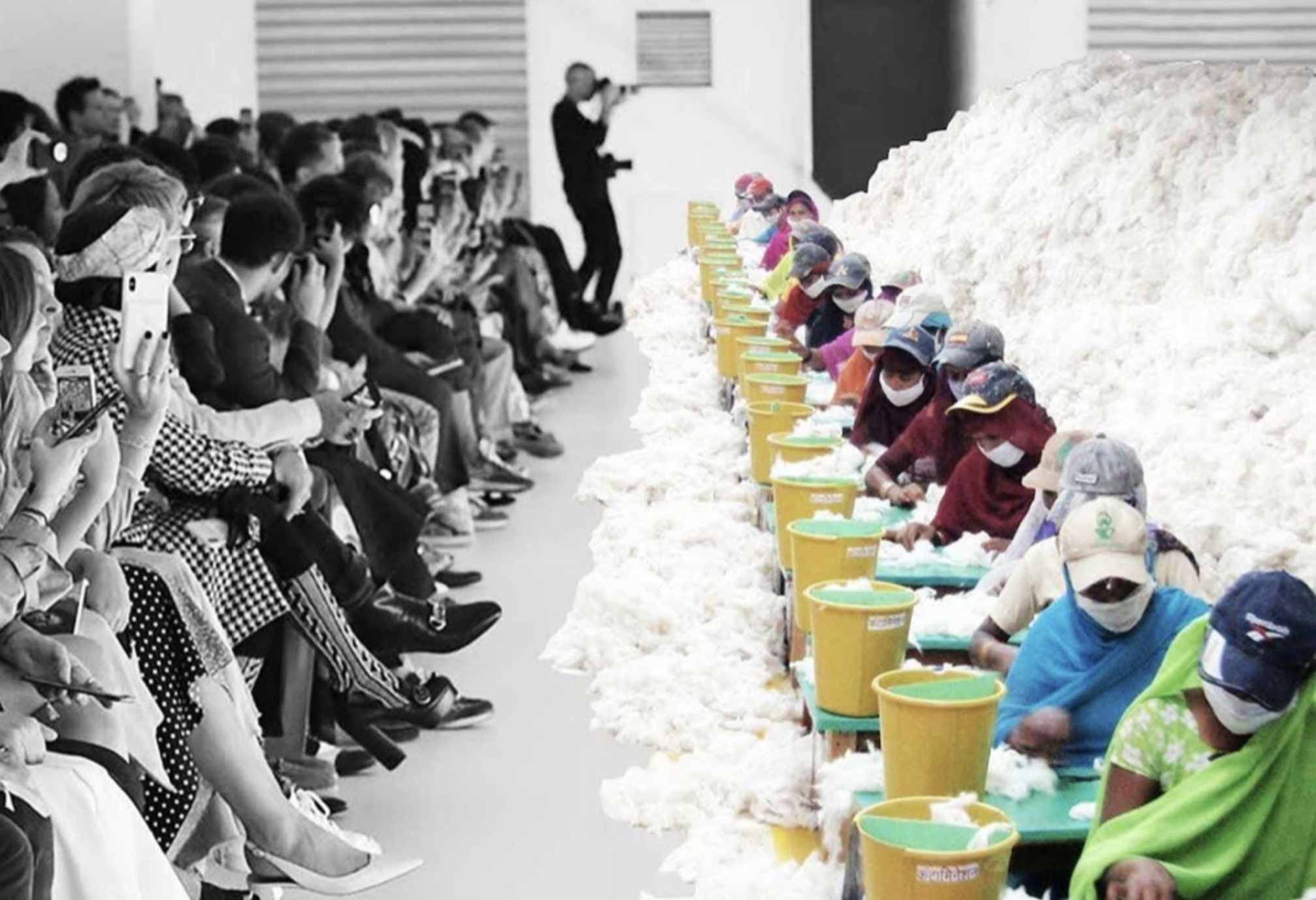Is the label “Made in Europe” a guarantee of fair and ethical production? Should fashion brands that produce in the Global South be avoided altogether? And what happens to your online returns — are they resold to other customers?
These thought-provoking questions force us to confront the harsh realities and hidden truths within the fashion industry. And with the rise of ethical and sustainable fashion, many of us like to think that our favorite brands, especially those who “produce” in Europe follow fair and sustainable practices. But, is this necessarily true? In this blog post, we will take a look at fashion myths and uncover the truth about sustainable clothing.
Seven Myths: Unveiling the Facts of the Fashion Industry
»Made in Europe guarantees fair and ethical production.«
Fact: It’s a common misconception that products manufactured in Europe are always produced under fair and ethical circumstances. Just because a product is stamped with a “Made in Europe” label does not guarantee the fair treatment of workers, responsible sourcing of materials, or adherence to ethical business practices.
A report by the Clean Clothes Campaign highlighted the issue of sweatshops in Eastern Europe, where garment workers are paid below the poverty line. We need to take a more critical approach when evaluating the origins of the products we consume and demand transparency from companies to ensure that they are operating in a responsible and ethical way.
»When companies claim to produce goods ethically, we can rely on their credibility.«
Fact: As consumers become more conscious about their environmental impact, many companies are quick to advertise their products as being “eco-friendly” or “fair trade.” However, just because a company claims to be doing good doesn’t necessarily mean that they are. This phenomenon is called “greenwashing” and it’s a tactic used by companies to make themselves look better without actually following through on their promises.
For example, a company may advertise its products as being fair trade, but if they’re not certified by a reputable organization, it’s difficult to tell if they’re actually treating their workers fairly. For us, as consumers, it’s important to do our research and hold companies accountable for their actions, rather than just taking their word for it.
»Fashion brands producing in the Global South should be avoided.«
Fact: Fashion productions in the Global South often come under scrutiny for their lack of fair labor practices and sustainability concerns. It is true that many brands often rely on exploitative labor practices, taking advantage of low wages and poor working conditions prevalent in many developing countries. However, there are brands working towards making a difference.

Take for example the fashion brand Ametou. They believe that fashion can and should be produced in a way that is both ethical and sustainable. That’s why Ametou takes great care to ensure that their clothing is made under fair working conditions and with eco-friendly materials.
You might also be interested in “How Sustainable Fashion Transforms Lives”
»Your clothes are entirely produced where the label says.«
Fact: Although your clothing tag may indicate it was “Made in Austria” or “Made in Europe”, it cannot provide insight into the intricate labor process involved in its production. In fact, the textile industry is known for its global supply chain, with fabrics and components sourced from various countries and assembled in a different location altogether.
This means that your shirt may have been sewn in one country, made with fabric from another, and designed by a team from yet another corner of the world. While the exact production process may be a mystery to many consumers, it’s clear that there’s more to our clothing than meets the eye.
»Luxury fashion is more sustainable than fast fashion.«
Fact: There’s a common myth circulating that luxury fashion is more sustainable than fast fashion. They may come with high prices and are often associated with higher quality materials, but the idea that they are automatically more environmentally friendly is a misconception. In many cases, luxury brands still contribute to the same issues associated with fast fashion, including excessive waste, pollution, and unethical labor practices.
For instance, textile factories of luxury brands like Prada, Salvatore Ferragamo, Fendi, and Christian Dior are more likely to employ workers who are at risk of exploitation than fast fashion brands, according to FastCompany.
If you would like to know more about labor in global supply chains, you can also take a look at KnowTheChain. They are a non-governmental organization that ranks companies according to how much they have improved their supply chains to avoid using exploited labor to make their products.

»Donating old clothes is always sustainable.«
Fact: Donating used clothing is generally beneficial and a sustainable way to clean out your closet, but there are challenges related to quality control and waste management that need to be mindfully considered.
The goal should be to extend the clothes’ lifecycle, not to displace waste. Unfortunately, a large percentage of donations get exported and, due to quality issues, end up in the landfills of importing countries, exacerbating their waste problems.
According to Greenpeace, in Accra, Ghana, 40% of the 15 million weekly imported second-hand clothes from developed countries are deemed unusable and end up in landfills. So you should donate and repurpose your items responsibly to organizations that effectively utilize them.
»Your online returns are resold to other customers.«
Fact: Did you know that around 30% of online purchases are returned and many end up in landfills? While low prices and discounts on fast fashion are appealing, these items often come with quality and fit issues, leading to an increase in returns. Impulsive buying also contributes to the problem, as buyers regret their purchases and send them back.
For retailers, processing returns can be complicated, and the state of returned items is often unknown. Repairing and reselling fashion items can often be more expensive than the revenue generated from them, particularly due to the costly nature of employing domestic workers for labor-intensive returns processing. In fact, getting rid of returns is usually more cost-effective than processing them.
To give an example, Nike has been caught red-handed in a sneaky recycling scheme that goes against its claims of sustainability. According to a report by Tagesschau, Nike was found to be destroying new products under the guise of a recycling program. GPS trackers revealed that instead of being returned to the warehouse, new sneakers were sent to a recycling center in Herenthout, Belgium.
So think twice about hitting the “buy” button when you’re unsure about the size or your level of satisfaction with the item. Making a conscious decision before making a purchase can help reduce the likelihood of returns and contribute to a more sustainable approach to online shopping.

What facts surprised you the most?
Leave a comment and share your thoughts on Instagram to help raise awareness! @ametou.official




There are no comments